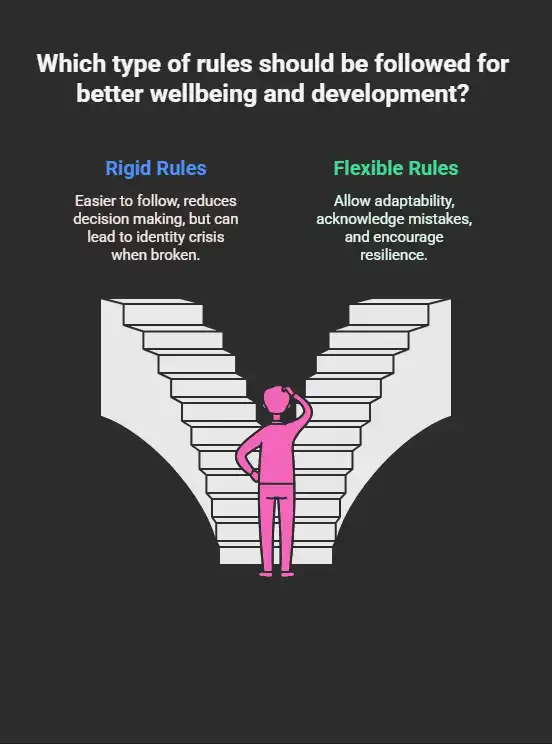Is it better to live by rigid rules that offer clarity—or flexible ones that offer resilience? What if the very thing that makes strict principles powerful is also what makes them brittle? Explore how we can stay true to our values without breaking under the weight of perfection.

Too Rigid, or not Too Rigid, that is the Question
As a secular person, the thing that I love about religion is also the thing that frustrates me.
No, this is not a post about religion, but it will serve a point.
You can't help but be in awe by the way religious people can maintain a certain way of life as if there wasn't even an option to choose any other way. They live consistently by their moral code, which is more than most of us can say.
There's power in having creeds. When we have an unbreakable rule, such as "I don't eat meat", it makes life easier because we don't have to debate each time whether we should eat meat or not. The expectations are clear.
Also, we can't make excuses - like "nuggets are not really meat because it's chicken". There's no one else to fool but ourselves.
Such rules are likely to become our second nature. With time, discipline turns to automatic behavior, becoming our default.
However, every rule is bound to be broken, whether by mistake, bad luck, laziness, or enough pressure, we will slip up.
When rigid rules are broken, they are broken "big time". These rules are so entrenched in our identity, that when they break - we break. Our motivation collapses, and there's no going back now.
Like a person with 2000 days streak on Duolingo that skipped a single day (without streak freezes), they'll likely delete the app and stop learning for months if not ever.
If you don't want to put all your eggs in the "rigid rule" basket, you can choose to have flexible rules, like "I try to avoid eating meat". It doesn't mean you never eat meat, and (unfortunately) it's up to you to decide what counts as following this rule.
On the bright side, failing to uphold this rule is not as shattering as breaking a rigid rule. Even if you fail by your standards, you can get back up. The fall isn't that high.
You can reflect on your choices, what led to your failure, and what can you do better next time. You can also improve your standards with time. At first "avoid eating meat" can be translated as eating meat every other day, and with time it can be "only on special occasions".
Flexible rules acknowledge our humanity, the good and the bad.
Yes, we can lie to ourselves and make excuses, but it also allows us to adjust based on our circumstances, and to get back up after we fall. The important thing is to focus on being true to values essence, and not to a perfect unreachable version of them.
Actionable Tips: How to Set Smarter, Compassionate Rules
- Stay true to values, not rules – Being a moral person is more complex than following rigid rules, we are humans, we slip up, we have multiple conflicting values, and we live in complex reality. So focus on being true to your values, good behavior will follow
- Build flexibility in – Allow yourself some "mulligans", like streak freezes for cases when following the rule simply isn't possible. Give yourself a chance to skip without calling it (and yourself) a failure.
- Celebrate resilience, not just consistency – Be compassionate to yourself, remember that getting back up is more important than staying on track.
Ask Yourself
- Do I tend to lean toward rigid or flexible rules in my life?
- Have I ever lost motivation after “breaking” a rule?
- How can I build rules that honor both values and self-compassion?